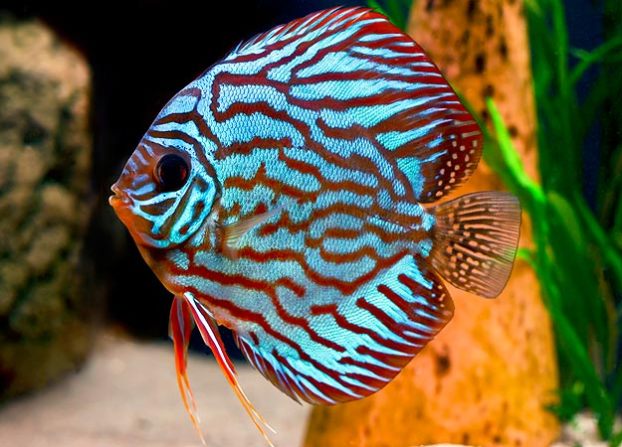

Heckel, Brown, Green, Blue, Blue Turquoise, Red Turquoise, Pigeon Blood, Blue Diamond, Leopard Skin, Snakeskin, Leopard Snakeskin, Snow White, Golden, etc.Īquariums with discus are visually stunning, but many have stayed away from this fish because of its complicated care. Once the eggs hatch, the parents start to excrete a type of mucus from their bodies on which the fry feed on for the first few weeks of their life. Once the eggs are laid, both parents will care for them until they hatch. When this happens, it is advisable to remove the breeding pair to a separate aquarium with ample flat surfaces like rocks or plant leaves where the fish will lay their eggs. When a breeding pair is formed, they will select a breeding territory within the aquarium and defend it from other fish. It is virtually impossible to sex discus fish, and the best way to breed them is to raise a shoal of six or more discus in optimum water conditions and let them form pairs on their own. They can also be fed on chopped beef liver and specialized flake foods.ĭiscus fish are extremely sensitive to changes in water quality and temperature and can perish when subject to stress and abrupt changes in water conditions. These fish are carnivores and thrive when fed on live foods like Blood Worm, Brine Shrimp, Mosquito Larvae and Tube Worms. They will often be bullied and out-competed for food by the more aggressive and assertive species of fish and can die of stress and malnourishment. When cared for well, they will usually grow up to a length of 6 inches and can sometimes even reach lengths of 8 inches.ĭiscus fish are extremely peaceful in nature and will not do well when kept with more competitive and aggressive species of fish. It is also important to maintain excellent water conditions and filtration in the discus aquarium and it is advisable to carry out partial water changes each week. They are a very shy, easily frightened species of fish, so it is important to recreate this type of natural habitat in the discus aquarium with subdued lighting, dark substrate and open swimming space and plenty of hiding places.

In their natural habitat, discus live in slow moving tributaries and forest pools amongst dense vegetation, tree roots and rocks. These fish are extremely sensitive to changes in water quality and temperature and can perish when subject to stress and abrupt changes in water conditions. They prefer very soft, warm, acidic water, and extreme care needs to be taken to ensure that their aquarium parameters remain stable. While most wild discus are a drab brown or green in color, modern strains come in a variety of vibrant shades of blue, green, yellow, red and white.ĭiscus fish are one of the hardest species of freshwater aquarium fish to keep. The discus fish is native to the Amazon River basin in tropical South America. Often regarded as the king of the freshwater aquarium, discus fish are one of the most beautiful species of freshwater aquarium fish and one of the hardest to keep. Discus fish have laterally compressed and almost perfectly round, disc shaped bodies and sport two long pelvic fins. While they can be kept in an aquarium with other peaceful species of freshwater fish, it is recommended that they be kept in a ‘species tank’ due to their very specific tank and water requirements. Discus fish are extremely peaceful and shy in temperament and do best when kept in groups of six or more. The demanding aquarium conditions that these fish require to survive make it an unsuitable fish for beginner and intermediate aquarists.



 0 kommentar(er)
0 kommentar(er)
